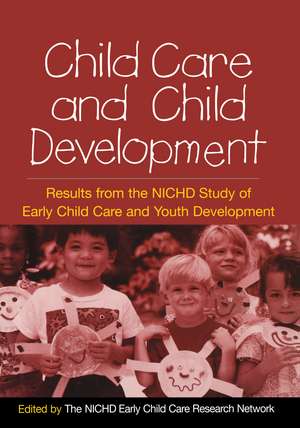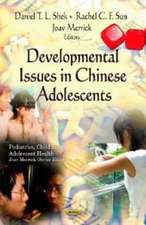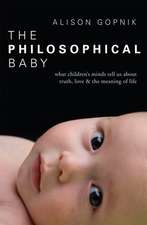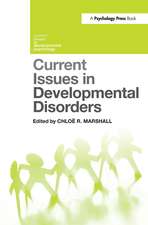Child Care and Child Development: Results from the NICHD Study of Early Child Care and Youth Development
Editat de NICHD Early Child Care Researcen Limba Engleză Paperback – 23 feb 2006
This important work presents the results of the most comprehensive scientific study to date of early child care and its relation to child development. In one volume, a critical selection of material from the most salient journal articles is brought together with new overviews and a concluding commentary. Provided is a wealth of authoritative information about the ways in which nonmaternal care is linked to health, psychological adjustment, and mother-child bonds in the first six years of life. An essential resource for developmentalists, early child care specialists, and educators, the book offers compelling perspectives on practice, policy, and research.
| Toate formatele și edițiile | Preț | Express |
|---|---|---|
| Paperback (1) | 405.89 lei 6-8 săpt. | |
| Guilford Publications – 23 feb 2006 | 405.89 lei 6-8 săpt. | |
| Hardback (1) | 779.66 lei 6-8 săpt. | |
| Guilford Publications – 29 apr 2005 | 779.66 lei 6-8 săpt. |
Preț: 405.89 lei
Preț vechi: 427.25 lei
-5% Nou
Puncte Express: 609
Preț estimativ în valută:
77.70€ • 81.08$ • 65.14£
77.70€ • 81.08$ • 65.14£
Carte tipărită la comandă
Livrare economică 13-27 martie
Preluare comenzi: 021 569.72.76
Specificații
ISBN-13: 9781593852870
ISBN-10: 1593852878
Pagini: 474
Ilustrații: black & white illustrations
Dimensiuni: 156 x 234 x 27 mm
Greutate: 0.69 kg
Ediția:1Prescurtată
Editura: Guilford Publications
Colecția Guilford Press
ISBN-10: 1593852878
Pagini: 474
Ilustrații: black & white illustrations
Dimensiuni: 156 x 234 x 27 mm
Greutate: 0.69 kg
Ediția:1Prescurtată
Editura: Guilford Publications
Colecția Guilford Press
Public țintă
Professional Practice & DevelopmentCuprins
Foreword, Duane Alexander
I. Overview
1. Nonmaternal Care and Family Factors in Early Development: An Overview of the NICHD Study of Early Child Care, NICHD Early Child Care Research Network
II. Child Care Use and Quality
2. Child Care in the First Year of Life, NICHD Early Child Care Research Network
3. Characteristics of Infant Child Care: Factors Contributing to Positive Caregiving, NICHD Early Child Care Research Network
4. Child Care Characteristics of Infants with and without Special Needs: Comparisons and Concerns, Cathryn L. Booth and Jean F. Kelly
5. A New Guide for Evaluating Child Care Quality, NICHD Early Child Care Research Network
6. Characteristics and Quality of Child Care for Toddlers and Preschoolers, NICHD Early Child Care Research Network
III. Why Consider Family Effects in a Study of Child Care?
7. Familial Factors Associated with the Characteristics of Nonmaternal Care of Infants, NICHD Early Child Care Research Network
8. Before Head Start: Income and Ethnicity, Family Characteristics, Child Care Experiences, and Child Development, NICHD Early Child Care Research Network
9. Change in Family Income-to-Needs Matters More for Children with Less, Eric Dearing, Kathleen McCartney, and Beck A. Taylor
10. Chronicity of Maternal Depressive Symptoms, Maternal Sensitivity, and Child Functioning at 36 Months, NICHD Early Child Care Research Network
11. The Interaction of Child Care and Family Risk in Relation to Child Development at 24 and 36 Months, NICHD Early Child Care Research Network
IV. Child Care and Health
12. Child Care and Common Communicable Illnesses, NICHD Early Child Care Research Network
13. Child Care and Common Communicable Illnesses in Children Ages 37-54 Months, NICHD Early Child Care Research Network
V. Child Care and Mother-Child Relations
14. The Effects of Infant Child Care on Infant-Mother Attachment Security, NICHD Early Child Care Research Network
15. Child Care and Family Predictors of Preschool Attachment and Stability from Infancy, NICHD Early Child Care Research Network
16. Caregiver-Mother Partnership Behavior and the Quality of Caregiver-Child and Mother-Child Interactions, Margaret Tresch Owen, Anne M. Ware, and Bill Barfoot
17. Child Care and Mother-Child Interaction in the First 3 Years of Life, NICHD Early Child Care Research Network
18. Early Child Care and Mother-Child Interaction from 36 Months through First Grade, NICHD Early Child Care Research Network
VI. Child Care and Psychological Development
19. Early Child Care and Self-Control, Compliance, and Problem Behavior at 24 and 36 Months, NICHD Early Child Care Research Network
20. Early Child Care and Children's Peer Interaction at 24 and 36 Months, NICHD Early Child Care Research Network
21. Does Amount of Time Spent in Child Care Predict Socioemotional Adjustment during the Transition to Kindergarten?, NICHD Early Child Care Research Network
22. The Relation of Child Care to Cognitive and Language Development, NICHD Early Child Care Research Network
23. Does Quality of Child Care Affect Child Outcomes at Age 4 1/2?, NICHD Early Child Care Research Network
24. Child Outcomes When Child Care Center Classes Meet Recommended Standards for Quality, NICHD Early Child Care Research Network
25. Child Care Structure --> Process --> Outcome: Direct and Indirect Effects of Child Care Quality on Young Children's Development, NICHD Early Child Care Research Network
26. Early Child Care and Children's Development Prior to School Entry, NICHD Early Child Care Research Network
VII. Effects of Families on the Development of Children Who Are in Child Care
27. Factors Associated with Fathers' Caregiving Activities and Sensitivity with Young Children, NICHD Early Child Care Research Network
28. Relations between Family Predictors and Child Outcomes: Are They Weaker for Children with Child Care?, NICHD Early Child Care Research Network
29. Families Matter--Even for Kids in Child Care, NICHD Early Child Care Research Network
VIII. Commentary
30. Human Developmental Science Serving Children and Families: Contributions of the NICHD Study of Early Child Care, Sharon Landesman Ramey
I. Overview
1. Nonmaternal Care and Family Factors in Early Development: An Overview of the NICHD Study of Early Child Care, NICHD Early Child Care Research Network
II. Child Care Use and Quality
2. Child Care in the First Year of Life, NICHD Early Child Care Research Network
3. Characteristics of Infant Child Care: Factors Contributing to Positive Caregiving, NICHD Early Child Care Research Network
4. Child Care Characteristics of Infants with and without Special Needs: Comparisons and Concerns, Cathryn L. Booth and Jean F. Kelly
5. A New Guide for Evaluating Child Care Quality, NICHD Early Child Care Research Network
6. Characteristics and Quality of Child Care for Toddlers and Preschoolers, NICHD Early Child Care Research Network
III. Why Consider Family Effects in a Study of Child Care?
7. Familial Factors Associated with the Characteristics of Nonmaternal Care of Infants, NICHD Early Child Care Research Network
8. Before Head Start: Income and Ethnicity, Family Characteristics, Child Care Experiences, and Child Development, NICHD Early Child Care Research Network
9. Change in Family Income-to-Needs Matters More for Children with Less, Eric Dearing, Kathleen McCartney, and Beck A. Taylor
10. Chronicity of Maternal Depressive Symptoms, Maternal Sensitivity, and Child Functioning at 36 Months, NICHD Early Child Care Research Network
11. The Interaction of Child Care and Family Risk in Relation to Child Development at 24 and 36 Months, NICHD Early Child Care Research Network
IV. Child Care and Health
12. Child Care and Common Communicable Illnesses, NICHD Early Child Care Research Network
13. Child Care and Common Communicable Illnesses in Children Ages 37-54 Months, NICHD Early Child Care Research Network
V. Child Care and Mother-Child Relations
14. The Effects of Infant Child Care on Infant-Mother Attachment Security, NICHD Early Child Care Research Network
15. Child Care and Family Predictors of Preschool Attachment and Stability from Infancy, NICHD Early Child Care Research Network
16. Caregiver-Mother Partnership Behavior and the Quality of Caregiver-Child and Mother-Child Interactions, Margaret Tresch Owen, Anne M. Ware, and Bill Barfoot
17. Child Care and Mother-Child Interaction in the First 3 Years of Life, NICHD Early Child Care Research Network
18. Early Child Care and Mother-Child Interaction from 36 Months through First Grade, NICHD Early Child Care Research Network
VI. Child Care and Psychological Development
19. Early Child Care and Self-Control, Compliance, and Problem Behavior at 24 and 36 Months, NICHD Early Child Care Research Network
20. Early Child Care and Children's Peer Interaction at 24 and 36 Months, NICHD Early Child Care Research Network
21. Does Amount of Time Spent in Child Care Predict Socioemotional Adjustment during the Transition to Kindergarten?, NICHD Early Child Care Research Network
22. The Relation of Child Care to Cognitive and Language Development, NICHD Early Child Care Research Network
23. Does Quality of Child Care Affect Child Outcomes at Age 4 1/2?, NICHD Early Child Care Research Network
24. Child Outcomes When Child Care Center Classes Meet Recommended Standards for Quality, NICHD Early Child Care Research Network
25. Child Care Structure --> Process --> Outcome: Direct and Indirect Effects of Child Care Quality on Young Children's Development, NICHD Early Child Care Research Network
26. Early Child Care and Children's Development Prior to School Entry, NICHD Early Child Care Research Network
VII. Effects of Families on the Development of Children Who Are in Child Care
27. Factors Associated with Fathers' Caregiving Activities and Sensitivity with Young Children, NICHD Early Child Care Research Network
28. Relations between Family Predictors and Child Outcomes: Are They Weaker for Children with Child Care?, NICHD Early Child Care Research Network
29. Families Matter--Even for Kids in Child Care, NICHD Early Child Care Research Network
VIII. Commentary
30. Human Developmental Science Serving Children and Families: Contributions of the NICHD Study of Early Child Care, Sharon Landesman Ramey
Notă biografică
The editors of this volume are members of The NICHD Early Child Care Research Network, as of 2004. The Network was established in 1989 and began working on the NICHD Study of Early Child Care and Youth Development. Members of the Network have designed, implemented, analyzed, and written about this study as a collective.
Members of The NICHD Early Child Care Research Network in 2004, listed alphabetically, are Virginia Allhusen, PhD, Jay Belsky, PhD, Cathryn Booth-LaForce, PhD, Robert Bradley, PhD, Celia A. Brownell, PhD, Margaret Burchinal, PhD, Susan B. Campbell, PhD, K. Alison Clarke-Stewart, PhD, Martha Cox, PhD, Sarah L. Friedman, PhD, Willard W. Hartup, EdD, Kathryn Hirsh-Pasek, PhD, Aletha C. Huston, PhD, Deborah Johnson, PhD, Bonnie Knoke, MS, Nancy Marshall, EdD, Kathleen McCartney, PhD, Frederick J. Morrison, PhD, Philip Nader, MD, Marion O'Brien, PhD, Margaret Tresch Owen, PhD, Ross D. Parke, PhD, Deborah Phillips, PhD, Robert Pianta, PhD, A. Vijaya Rao, PhD, Wendy W. Robeson, EdD, Carolyn Roy, PhD, Susan Spieker, PhD, Deborah Lowe Vandell, PhD, and Marsha Weinraub, PhD.
Members of The NICHD Early Child Care Research Network in 2004, listed alphabetically, are Virginia Allhusen, PhD, Jay Belsky, PhD, Cathryn Booth-LaForce, PhD, Robert Bradley, PhD, Celia A. Brownell, PhD, Margaret Burchinal, PhD, Susan B. Campbell, PhD, K. Alison Clarke-Stewart, PhD, Martha Cox, PhD, Sarah L. Friedman, PhD, Willard W. Hartup, EdD, Kathryn Hirsh-Pasek, PhD, Aletha C. Huston, PhD, Deborah Johnson, PhD, Bonnie Knoke, MS, Nancy Marshall, EdD, Kathleen McCartney, PhD, Frederick J. Morrison, PhD, Philip Nader, MD, Marion O'Brien, PhD, Margaret Tresch Owen, PhD, Ross D. Parke, PhD, Deborah Phillips, PhD, Robert Pianta, PhD, A. Vijaya Rao, PhD, Wendy W. Robeson, EdD, Carolyn Roy, PhD, Susan Spieker, PhD, Deborah Lowe Vandell, PhD, and Marsha Weinraub, PhD.
Recenzii
This 'must-read' volume describes one of the most comprehensive and innovative child development studies of the last 20 years. It brings together, for the first time, essential findings on how child care quality, family environment, and parenting together contribute to a child’s life chances. The authors provide a compelling story of young children’s experiences today and the challenges facing parents as they make choices about work and care. Psychologists, social scientists, and policymakers concerned with early childhood education, family social policy, and pediatric health will find this book extremely valuable.--Jeanne Brooks-Gunn, PhD, Teachers College and College of Physicians and Surgeons, Columbia University
The NICHD Study of Early Child Care and Youth Development is a critically important milestone in the science of human development. The results compellingly illustrate the powerful roles of child care experience and family dynamics in shaping human adaptation and development. The results also offer a somber warning on the developmental consequences of poor-quality out-of-home care, which is all too prevalent in the United States. This book can and should influence every child care provider, parent, and policymaker to strive for an improvement in the quality of child care and of family social policy.--Craig T. Ramey, PhD, Center on Health and Education, Georgetown University
This book is a badly needed compilation and interpretation of the multifaceted results of the landmark NICHD study of child care in America. This is not only the single most important study of child care ever done, but it was undertaken by a group of extremely knowledgeable scholars. Their willingness to explore conventional as well as controversial issues concerning the effects of early care experiences on the developing child makes this volume a treasure.--Edward Zigler, PhD, Department of Psychology (Emeritus), Yale University
-The NICHD Study of Early Child Care and Youth Development is a critically important milestone in the science of human development. The results compellingly illustrate the powerful roles of child care experience and family dynamics in shaping human adaptation and development. The results also offer a somber warning on the developmental consequences of poor-quality out-of-home care, which is all too prevalent in the United States. This book can and should influence every child care provider, parent, and policymaker to strive for an improvement in the quality of child care and of family social policy.--Craig T. Ramey, PhD, Center on Health and Education, Georgetown University
This book is a badly needed compilation and interpretation of the multifaceted results of the landmark NICHD study of child care in America. This is not only the single most important study of child care ever done, but it was undertaken by a group of extremely knowledgeable scholars. Their willingness to explore conventional as well as controversial issues concerning the effects of early care experiences on the developing child makes this volume a treasure.--Edward Zigler, PhD, Department of Psychology (Emeritus), Yale University
This well-organized volume begins with a much-needed and well-articulated overview of the original NICHD study design....A major strength of this volume is the abridged chapters, eliminating any redundancy....Given the purpose of this volume as a resource and a vehicle for disseminating what the NICHD research network felt was the most important information from the first phase of the NICHD study, it can be stated without reservation that its purpose was fulfilled and its contribution to the field is invaluable....Has immeasurable utility and vast applicability for individuals interested in dynamic interplay among family, child care, and early childhood development. Without doubt, this book should be considered a must have in most personal and institutional libraries.
--Journal of Child and Adolescent Psychopharmacology, 12/25/2005ƒƒThis is a landmark book and should be read by all who make decisions about day care. The topic is one of immense importance and will be of great interest to writers of textbooks and of books on parent-child relations. Its contents range broadly, going beyond day care to other concerns in the field of child development.
--PsycCRITIQUES, 12/25/2005Descriere
This important work presents the results of the most comprehensive scientific study to date of early child care and its relation to child development. In one volume, a critical selection of material from the most salient journal articles is brought together with new overviews and a concluding commentary.










